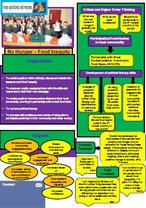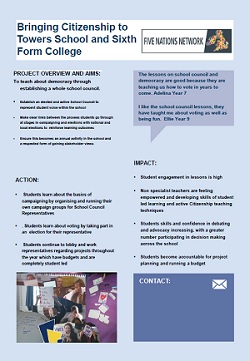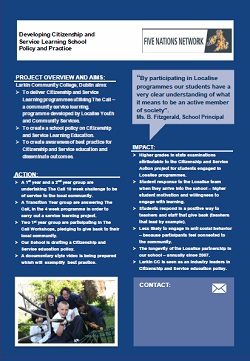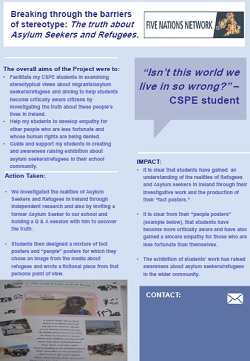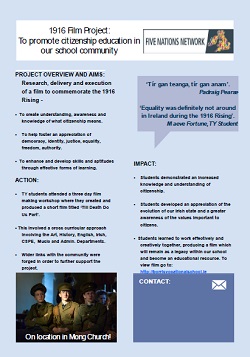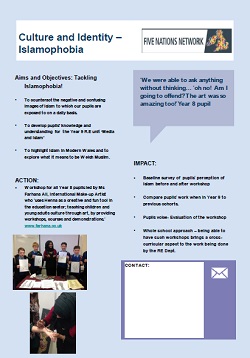Five Nations Development Projects (FNDPs)
Following an external review of the Small-scale Research Initiatives (SSRIs) in 2014, the Strategy Group decided to pilot a series of funded development projects (FNDPs) that support teachers' work to develop citizenship education or education for active citizenship in their schools. Teachers from across the five nations were invited to apply and we were pleased to fund six projects. Projects started during the autumn term of 2015 and the teachers attended the Cardiff 2016 conference to share their experiences and findings through short presentations. Each project lead gave a 'poster' presentation to highlight the aims, outcomes and impact of their work. The posters can be viewed below along with a short description of the project objectives.
Inspiring, Engaging, Invigorating... We need more classroom practice... Well done!
Initial Teacher Educator and CPD Professional, Ireland
|
Project name: Food Equity for All
Project lead: Claire Dunphy, St. Eunan’s Primary School, Clydebank, Scotland Article 24 of the UNCRC states that children have the right to good quality health care – the best health care possible – to safe drinking water, nutritious food, a clean and safe environment, and information to help them stay healthy. Pupils were asked to consider the statement 'Rich countries should help poorer countries achieve this', exploring the point that while we as a rich country should help poorer countries achieve their right to nutritious food, a substantial amount of children within our own 'rich country' do not receive this right. Key Objectives
Claire’s students (P7) have:
This project contributed to the work of the whole school on the Sustainable Development Goals, for which St Eunan's Primary won the Learning for Sustainability Award at the 2016 Scottish Education Awards. Watch a short video on how St Eunan's Primary School has been working on the Sustainable Development Goals as a whole school community. |
|
Project name: Foundation of School Council
Project lead: Zoe Bowden, Towers School and Sixth Form College, Kent, England This project aims to establish a school council framework, which is based on lessons about democracy. Pupils worked together in teams to develop clear goals for their pupil candidate. Elections were held in the autumn and the very first members of the school council were elected. The Council has a small budget which they use to plan for and run projects either in school or in the wider community. Once trained, leadership of the Council passed to elected members of the Sixth Form who will feed back to the school leadership at formal meetings. The aims of this project include to increase an understanding of how campaigning, voting and elections work through a real and practical experience. In addition, the Council will provide a mechanism to increase student participation in decision-making in school issues and the School Leadership Team now consult the School Council over key decisions. The FNDP grant has been used by pupils to undertake their first student led school council projects. The projects were chosen by Council members after taking the views of other pupils in the school. Wherever possible pupils will use their £100 as a start up grant, with the aim of returning the grant to the fund at the end of the project so it can be re-used for the next academic year. This is the first time a School Council has been established at Towers School. Citizenship learning has been rolled out across the entire school to support this work and a Year 7 scheme of work will be developed as a resource to support staff in teaching Citizenship in future years. |
|
Project name: Developing Citizenship and Service Learning School Policy and Practice
Project lead: Máire O’Higgins, Larkin Community College, Dublin, Ireland This project aimed to deliver Citizenship and Service Learning programmes utilising The Call - a community service learning programme developed by Localise Youth and Community Services. The Call can be implemented in three ways:
Approximately 185 Larkin Community College students were involved in this project, which will become a model of best practice that can be replicated in other schools. The college helped facilitate this process by video recording The Call programmes and using the edited videos as resource and exemplar materials for their colleagues, incoming students and other schools. The project will also create a school policy on Citizenship and Service Learning Education based on extrapolating from best practice. The resulting videos will be posted to websites including www.artsineducation.ie, www.localise.ie, www.larkincommunitycollege.ie and www.sccdublin.ie |
|
Project name: Migrants/Asylum Seekers/Refugees: Breaking the barriers of Stereotypes
Project lead: Sinead McCarthy, Scoil Mhuire, County Meath, Ireland In light of recent developments in Europe, this project aimed to critique the stereotypical views of migrants/asylum seekers/refugees that are portrayed by society and often passively absorbed. The project aimed to:
|
|
Project name: 1916 Film Project: To promote citizenship education in our school community.
Project lead: Jacqueline Sheil, Borris Vocational School, County Carlow, Ireland This project aimed to enable students to reflect on the significance of the 1916 Uprising for the Ireland of today through engaging in the research, delivery and execution of a film to celebrate this anniversary. With input and direction from Kilkenny Young Film Makers, the Transition Year class engaged in all aspects of creative and technical production whilst exploring and expressing their thoughts in visual form about this historical event and its relation to their identity as young Irish citizens today. This formed part of an Installation Art work, with the film being screened on the ceiling of a darkened room. Students were asked to lie down to view it as a mark of respect to those who sacrificed their life for the freedom of the Irish nation. The Music Department created an original music score to accompany the film. This citizenship action project was cross curricular, incorporating subject areas such as CSPE, Art, Irish, History and English, and helped to develop citizenship education within their school community. The intended project impact and outcomes were:
Update (2016) This FNDP received coverage in:
|
|
Project name: Culture and Identity - Islam in Wales and Islamophobia
Project lead: Menna Jenkins, Ysgol Gyfun Ystalyfera, Neath Port Talbot, Wales This project aimed to further develop the Year 9 RE unit ‘Media and Islam’. The majority of pupils, by nature of the school’s and community’s ethnicity, do not have any contact with Islam or Muslims in their daily lives. Most, if not all images and portrayals of Muslims and Islam to which the pupils are exposed are negative, confusing and in some cases frightening. As teachers, they are continually exploring ways of counteracting stereotypes and mis-information. The grant gave the pupils the opportunity to explore an aspect of Islam in modern Wales through participation in an Islamic Art, Culture and Symbols workshop led by a resident from the community. The project’s aims were as follows: Teachers
This project will be shared with a professional community of Neath Port Talbot RE Teachers who are working in partnership with the Centre for the Study of Islam UK at Cardiff University. The topic will be embedded into schemes of work and resources/lesson plans produced. An account of the activity will be on the school website and there will be a wall display in the school. |

